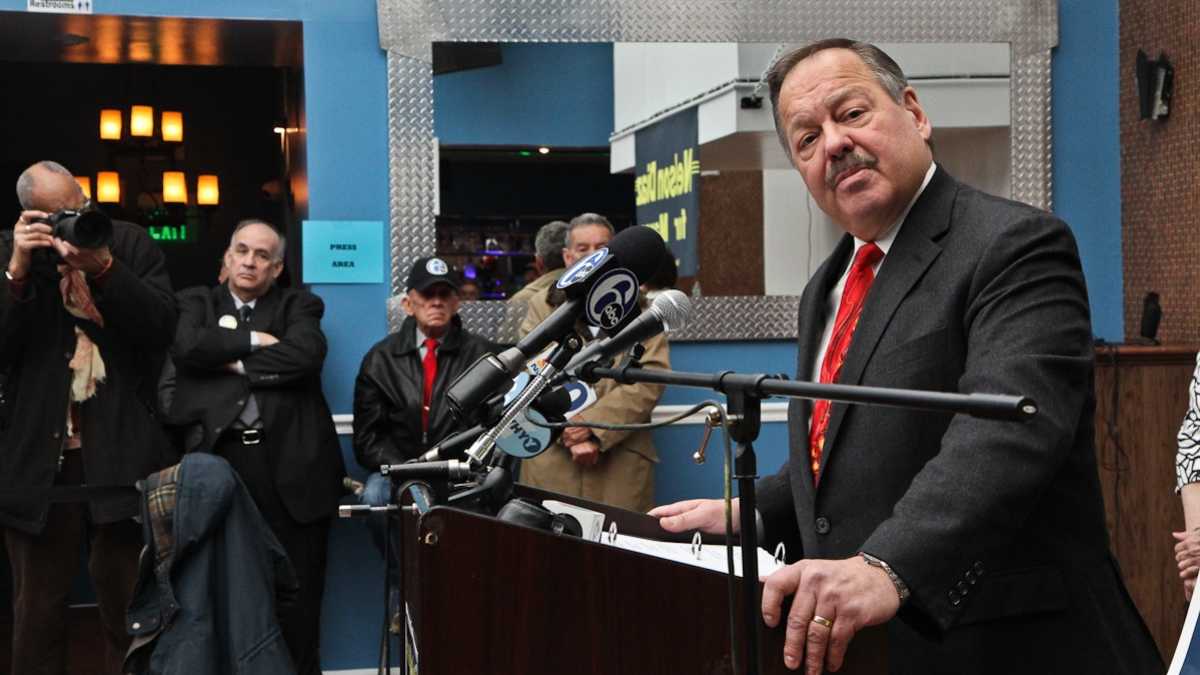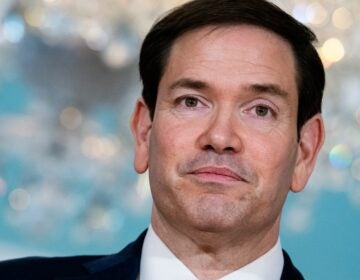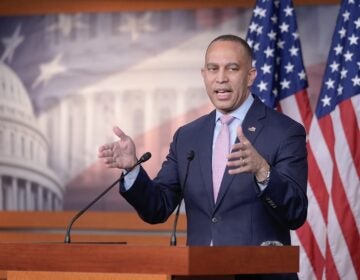Q&A: Nelson Diaz on affordable housing, attracting new business, and expanding SEPTA

PlanPhilly sat down with former Common Pleas Judge, Department of Housing and Urban Development General Counsel, Exelon Director and current Mayoral contender Nelson Diaz last week for a wide-ranging conversation that touched on a variety of planning topics, including affordable housing, attracting new businesses, and expanding SEPTA. For more on Diaz’s thoughts on the Nutter administration, deflation in Japan, Keystone Opportunity Zones, the DNC coming to Philadelphia, Frank Rizzo and much, much more, read the the full interview here. Here are a few edited and condensed highlights arranged by topics of interest.
On the most important development issues in Philadelphia:
Well there are three issues really. Schools, obviously … affects everything else. If we can keep those young folks and those young families here, that will help the tax issue.
Second issue that I think is a priority obviously is the workforce. You have to have a quality workforce for businesses to relocate to the city…. [Philadelphia needs] some kind of training so [residents] can get into a proper workforce … . And I think we could use some of the institutions we have, like the Community College [of Philadelphia] and some of the others that can be utilized in that fashion.
And then the third issue is a macroeconomic issue… we’re next to last in bringing small businesses into the city. You know who’s below us, right? Detroit. It’s ridiculous.
When you have such a vibrant, beautiful, attractive city, we should be able to increase our GDP through the process of bringing in small business, which creates more jobs than large businesses do. So I have a priority to essentially try to institute help bringing in smaller businesses, particularly in the technology [sector].
On affordable housing’s role in community development:
Affordable housing will allow a workforce to live in better conditions. [At HUD], I created the mixed-use development opportunities… [where private-sector real estate developers built] market-rate housing next to public housing, so you had a broader scope of investments….
We’ve done that kind of development all over the country, which … improves the quality of life for poor people because they see other professionals in the community. [Before, these communities] were repeating generations of poverty. But if [a child living in public housing] saw professionals in and around [the] area, ‘Oh, I could be a doctor, I could be a mentor, I could be a developer.’
We’ve lost almost 7,000 units of public housing…. If we put 7,000 units back into place… we could then get HUD to reimburse us again for the amount that it costs to maintain those units.
I think that [home ownership] is what makes Philadelphia stronger. If you’re there, you preserve the community, you have equity in the place, and you can use that for your next house. It’s sort of an investment, like a moving-on-up situation.
On the increase of renting in Philadelphia, especially in growing neighborhoods:
[Another] problem is after the recession, a lot of people now are into rental housing instead of homeownership. So we’ve lost also a bulk of homeownership. Fishtown is an example. In Fishtown… the [new] developments [are] rental instead of homeownership. Philadelphia used to be one of the top cities in the country in terms of homeownership.
It’s a problem because people tend to invest in their homes because they see that as an opportunity for equity development…. The problem is that they’re renting because they can’t buy. There’s not enough opportunity for them to buy….
Fishtown is close to everything…. So for young people it’s really perfect, but young people will pick up and move any time they want [if they are just renting]. If you’ve got homeownership there, they’ll stay there. An average homeowner stays five to seven years; [renters will only] stay as long as it’s convenient to them…. So it doesn’t build a stable community if you have nothing but renters.
On attracting new businesses and reforming the tax structure:
We don’t have venture capital in this city. And venture capital is really what helps in terms of expansion or development of that. And if you look at Massachusetts, that’s what made them real capable. We have some of the best institutions [of higher education] in the world….
We’ve got to figure out how to bring something else into this city that would allow us to grow the economy so that young people can stay here.
Part of it is, there’s been very little leadership in the business community itself, which is evident from this election. This election, [the business community has] basically said, I’m the best for business, but can he raise the money? I mean – if I’m the best for business, business should be throwing money at me, and doing it because I’m the best. But that’s the way that people look at the business community here, as too weak to make a decision.
[But another problem] we have is that we have a reverse commute. 48 percent of the people who live in Philadelphia work outside the city. Part of [the reason for reverse commuting] is our tax structure.
We’ve got to work on the tax structure. We’ve got to work with the business community to understand how we can make this tax structure [better], because the more people that are here … you’re going to get more taxes. So you’ve got to develop a tax structure that is good also for business. And that’s a problem that they’ve never been able to negotiate with any mayor.
…I believe that commercial properties are willing to pay more taxes if there was a one-system process to pay taxes. You’ve got this gross tax issue, you’ve got this privilege tax, you’ve got the occupancy tax—you go all the way down the line picking at you every item…. But if we did it totally in one concept of taxing, [the business community would support the reform].
On public transportation:
[Generally, on transportation] we’re handcuffed. Everything that the state runs, we get handcuffed because the surrounding counties have a certain amount of influence over it. Or the state government, depending on the balance of power, has a lot of influence on it.
I think that if we had a governor that could essentially help us work together as a unit, to sit down with all of those different areas of interest—Chester County, Delaware County, Montgomery County and us—to sit down and try to develop a plan of action for the region, for the Southeast Pennsylvania region, I think we could be more effective.
On SEPTA expansion projects:
I think that because we are so close to New York, and such a better quality of living here, people would rather live here than Long Island. It takes them over an hour to get to New York City from Long Island. Takes about an hour from here if we had an affordable process of getting them to New York. You could have an express on SEPTA from here to Trenton, and it will take a lot less time for people to get down there.
[Extending the Broad Street Line to the Navy Yard] is an excellent proposal. …You could use a train that would take you to [the Navy Yard] because there’s more land there than there is in pretty much all of South Philadelphia.
On zoning and city planning reforms:
Let me tell you, changing a lot of the process in that area is something that I think is worthwhile because you have the prerogative of the Councilperson in that area, and that has just … always been an issue. Everybody should have equal access in terms of the zoning process, so I think what [Mayor Michael Nutter is] trying to do is right.
On making Philadelphia an energy hub and promoting clean technology:
…We had the refineries. The refineries left the area. That is catastrophic in terms of job opportunities and economically.
…But that’s an opportunity. The other opportunity, obviously, is creating jobs in the 21st century economy, which is a totally different kind of than we have in the past. There’s nothing like that on the East Coast. Comcast is starting to do that with their development of that new building, which is to bring a bunch of technological and technology professionals into this area.
… Silicon Valley doesn’t have to be just on the West Coast. You know, you can move these people anywhere you want. They’re in the West Coast because it’s nice living there, but you can move those kinds of folks—you’ve got to figure out what those incentives are to move and to create those opportunities. So we’ve got that as an opportunity.
I think we can do it. And it’s not pie in the sky. The economy is growing, you’ve got 80 universities.
… the hardest part is the capital, so that people can have growth opportunities and get venture capitalists in this area. We don’t have them. I don’t know why we don’t have them.
On marketing Philadelphia:
We’re known for cheesesteaks, and maybe Rocky, and that’s it. We have a lot more to offer in terms of the city and the marketing opportunities should be there.
WHYY is your source for fact-based, in-depth journalism and information. As a nonprofit organization, we rely on financial support from readers like you. Please give today.





